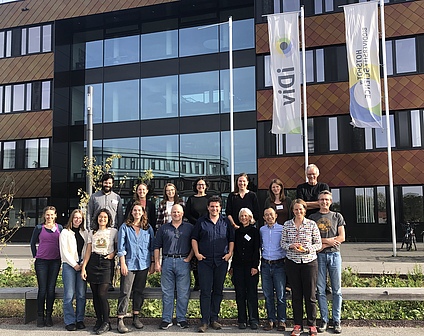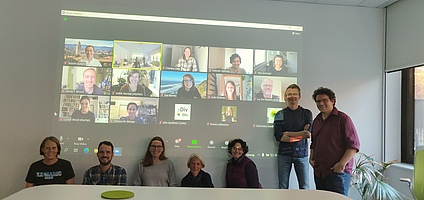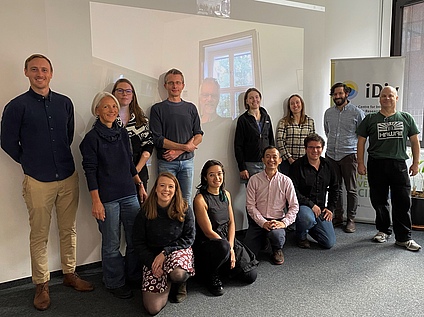sPriority - Mechanisms and Quantification of Priority Effects
First meeting: 27.09.-01.10.2021
PIs:
Benjamin Delory
Tadashi Fukami
iDiv members:
Jonathan Chase
Tiffany Knight
Project summary:
There is increasing recognition that the order and timing of species immigration can affect the structure and functioning of ecological communities via priority effects. Priority effects arise when early-arriving species affect the persistence and growth of later arrivers. When priority effects are strong enough to moderate local interspecific interactions, they could shape biodiversity and affect the functioning of ecosystems at both ecological and evolutionary time scales. Studies have shown that a wide range of mechanisms can cause priority effects. However, it remains unclear which mechanisms can be strong in what type of organisms and under what environmental conditions. In addition, there is currently no common framework for quantifying the strength of priority effects, thus hampering quantitative synthesis of priority effects across organisms and ecosystems. In this context, our proposed working group, sPriority, aims to (1) organize the definitions and mechanisms of priority effects, (2) develop a common framework for quantification of priority effects, (3) conduct a quantitative synthesis on priority effects using data from experiments that explicitly manipulated the timing and order of arrival of microorganisms, plants, or animals, and (4) investigate the importance of priority effects in structuring plant biodiversity using an ecological restoration database compiled as part of the Global Restore Project. By achieving these goals, the workshop will contribute to a better understanding of how, when, and where assembly history matters to biodiversity and the functioning of ecological communities.
In person participants:
Jonathan Chase (iDiv), Benjamin Delory (Leuphana University of Lüneburg); Julia Dieskau (Martin-Luther University Halle-Wittenberg), Paul Kardol (University of Agricultural Sciences), Tiffany Knight (iDiv), Emma Ladouceur (iDiv), Christiane Roscher (iDiv), Vicky Temperton (Leuphana University Lüneburg), Michael Wohlwend (Albert-Ludwigs-Universität Freiburg)
Remote participants:
Elle Barnes (Joint Genome Institute), Lynne Boddy (Cardiff University), Luc De Meester (IGB - Leibniz Institute for Freshwater Ecology and Inland Fisheries), Tadashi Fukami (Stanford University), Tess Grainger (University of British Columbia), Fletcher Halliday (University of Zurich), Chelsea Little (Simon Fraser University), Judith Sarneel (Umea University), James Stroud (Washington University), Chhaya Werner (University of Wyoming)
Second meeting: 26.-30.09.2022
In-person participants:
Elle Barnes (Joint Genome Institute), Jonathan Chase (iDiv), Benjamin Delory (Leuphana University of Lüneburg), Tadashi Fukami (Stanford University), Fletcher Halliday (University of Zurich), Paul Kardol (Swedish University of Agricultural Sciences), Emma Ladouceur (iDiv), Chelsea Little (Simon Fraser University), Christiane Roscher (iDiv), Judith Sarneel (Umea University), James Stroud (Washington University), Vicky Temperton (Leuphana University Lüneburg), Tamara van Stejin (Umea University)
Remote participants:
Jasmin Albert (University of Oregon), Luc De Meester (IGB - Leibniz Institute for Freshwater Ecology and Inland Fisheries), Julia Dieskau (MLU), Chhaya Werner (University of Wyoming)

Third meeting: 09.-13.10.2023
In person participants:
Elle Barnes (Rochester Institute of Technology), Jonathan Chase (iDiv), Benjamin Delory (Leuphana University of Lüneburg), Luc De Meester (Leibniz Institute of Freshwater Ecology and Inland Fisheries), Julia Dieskau (MLU), Tadashi Fukami (Stanford University), Fletcher Halliday (Oregon State University), Paul Kardol (Swedish University of Agricultural Sciences), Tiffany Knight (iDiv), Emma Ladouceur (iDiv), Chelsea Little (Simon Fraser University), Hannah Marton (Simon Fraser University), Christiane Roscher (iDiv), Judith Sarneel (Umea University), Isabelle Stiver (Oregon State University), Vicky Temperton (Leuphana University Lüneburg), Tamara van Stejin (Umeå University)
Remote participants:
Tess Grainger (University of Guelph), James Stroud (Georgia Institute of Technology)


